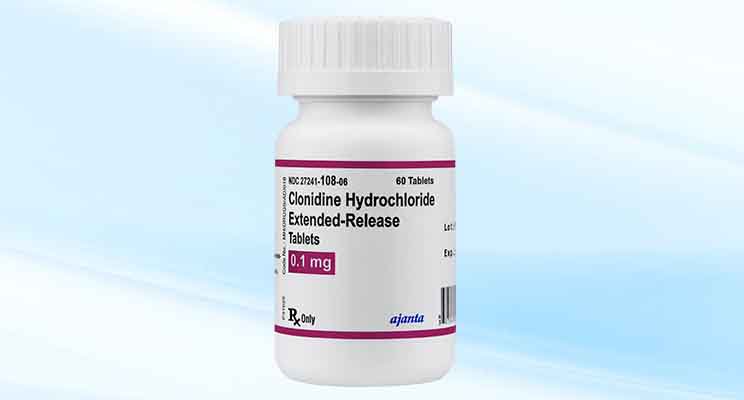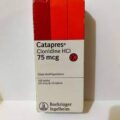Clonidine, sold as the brand name Catapres among others, is a medication used to treat high blood pressure, spasticity and certain pain conditions. It is used by mouth, by injection, or as a skin patch. Clonidine was originally developed in 1962 for use as a nasal decongestant. However, rapid recognition of its ability to reduce blood pressure led to the FDA approval of this agent for the treatment of hypertension in 1974. During the 1970s, clonidine gained popularity as treatment for hypertension since it was not linked with the postural and exercise-induced hypotension common in other antihypertensive regimens.
High blood pressure is a common condition and when not treated, can cause damage to the brain, heart, blood vessels, kidneys and other parts of the body. Damage to these organs may cause heart disease, a heart attack, heart failure, stroke, kidney failure, loss of vision, and other problems. In addition to taking medication, making lifestyle changes will also help to control your blood pressure. These changes include eating a diet that is low in fat and salt, maintaining a healthy weight, exercising at least 30 minutes most days, not smoking, and using alcohol in moderation.
Clonidine treats high blood pressure by decreasing your heart rate and relaxing the blood vessels so that blood can flow more easily through the body. Clonidine extended-release tablets may treat ADHD by affecting the part of the brain that controls attention and impulsivity. Clonidine extended-release (long-acting) tablets (Kapvay) are used alone or in combination with other medications as part of a treatment program to control symptoms of attention deficit hyperactivity disorder (ADHD; more difficulty focusing, controlling actions, and remaining still or quiet than other people who are the same age) in children.
Is Clonidine A Benzodiazepine?
Benzodiazepines are a class of drugs that produce central nervous system (CNS) depression and that are most commonly used to treat insomnia and anxiety. There is the potential for dependence on and abuse of benzodiazepines particularly by individuals with a history of multi-substance abuse.
Clonidine is NOT a benzodiazepine, but belongs to a class of medications called centrally acting alpha-agonist hypotensive agents. The classic centrally acting antihypertensives such as clonidine, (via its active metabolite alpha-methyl-noradrenaline) induce peripheral sympathoinhibition and a fall in blood pressure as a result of alpha2-adrenoceptor stimulation in the brain stem.
However, unwanted side effects of drowsiness, dry mouth, and sympathetic overactivity upon abrupt discontinuation led to a decline in its use. In 1996, a transdermal formulation renewed interest in the drug, as reported side effects were less pronounced than with oral treatment.
Today, with the development and marketing of newer products, the use of clonidine in the treatment of hypertension is limited; however this agent’s ability to modify both central and peripheral adrenergic transmission is proving to be of increasing interest to health care practitioners. Clonidine’s unique mechanism of action has prompted many to investigate its therapeutic potential in several different disease states.
Precautions to adopt when using Clonidine
According to Mayo Clinic, It is important that your doctor check your progress at regular visits to make sure that this medicine is working properly. Blood tests may be needed to check for any unwanted effects.
Do not interrupt or stop taking this medicine without first checking with your doctor. Your doctor may want you to gradually reduce the amount you are taking before stopping it completely. Your blood pressure may become worse when the medicine is stopped suddenly, which can cause serious side effects.
Make sure that you have enough clonidine on hand to last through weekends, holidays, or vacations. You should not miss any doses. You may want to ask your doctor for a second written prescription for clonidine to carry in your wallet or purse. You can have it filled if you run out of medicine when you are away from home.
Do not take other medicines unless they have been discussed with your doctor. This includes prescription or nonprescription (over-the-counter [OTC]) medicines and herbal or vitamin supplements. You should avoid over-the-counter [OTC] medicines for appetite control, asthma, colds, cough, hay fever, or sinus problems, since they may tend to increase your blood pressure.
Clonidine will add to the effects of alcohol and other central nervous system (CNS) depressants. CNS depressants are medicines that slow down the nervous system and may cause drowsiness. Some examples of CNS depressants are antihistamines or medicine for hay fever, allergies, or colds; sedatives, tranquilizers, or sleeping medicine; prescription pain medicine or narcotics; barbiturates or medicine for seizures; muscle relaxants; or anesthetics, including some dental anesthetics. Check with your doctor before taking any of the above while you are using this medicine.
Clonidine may cause some people to become drowsy or less alert than they are normally. This is more likely to happen when you begin to take it or when you increase the amount of medicine you are taking. Make sure you know how you react to this medicine before you drive, use machines, or do anything else that could be dangerous if you are not alert.
Before having any kind of surgery (including dental surgery) or emergency treatment, tell the medical doctor or dentist in charge that you are using this medicine.
This medicine may cause dryness of the eyes. If you wear contact lenses, this may be a problem for you. Talk to your doctor if you wear contact lenses, and discuss how to treat the dryness. READ: Is Clonidine A Controlled Substance?





